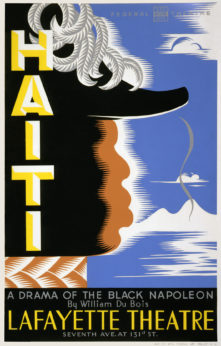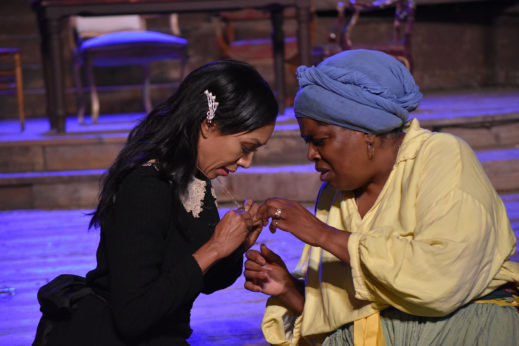
LOS ANGELES—Southern Californians have a unique opportunity to experience the first-ever revival of a historical melodrama about the Haitian Revolution that first strode the stage at New York’s Lafayette Theatre in Harlem opening in March 1938 as part of the WPA’s Federal Theatre Project (FTP). It’s the 80th anniversary of that pathbreaking piece of New Deal theatre.
William DuBois’s Haiti (seen August 11) is a swashbuckling melodrama about the 1802 overthrow of the French colonial regime in what they called Saint-Domingue—Haiti is the proud indigenous name. The Haitian rebels’ leaders were Toussaint L’Ouverture (Rodrick Jean-Charles) and General Henri Christophe (Max Lawrence). Subtitled “A drama of the black Napoleon,” Haiti was originally presented by the Federal Theatre’s Negro Theatre Unit (among a number of other ethnic and language units as well). This radical and controversial production, overseen by African-American director Maurice Clark, saw white and black actors performing onstage together, even holding hands, and also included an interracial marriage—illegal in many parts of the United States at the time—and an interracial romance (involving the same woman). More than 74,000 theatergoers saw Haiti at the Lafayette, before it moved from Harlem to Daly’s Theatre on Broadway (where Canada Lee had his first major role as Christophe) and then to Boston for a brief run. It score was by the eminent composer/conductor Leonard de Paur.
Haiti explores the devastating legacy of colonialism and slavery that was overcome by the strength, resilience and urgency of those brave enough to fight for freedom. Black lives not only mattered, it became a national liberation movement. As the first country in the Western Hemisphere to abolish slavery, Haiti set a powerful example to the United States, Cuba, Brazil and other slave nations. Shortly after its own revolution in 1789, the French National Assembly granted Haiti its independence.
The play, and the history on which it is based, now shows the French under Napoleon—often considered the carriers of Enlightenment and democratic government to a feudal, despotic world—betraying their own revolutionary principles of “liberté, egalité, fraternité” if re-occupying Haiti meant regaining a foothold in the rum and slave economy of the Caribbean, and a military outpost to counter their British foes. Haiti is described as “a sugar plum for Paris.” No wonder Beethoven angrily withdrew his dedication of the Eroica Symphony to Napoleon.
General Christophe sneers at the French hypocrisy, saying, “Liberty, equality, fraternity—if your skin is white enough.” The French soldiers singing the revolutionary anthem “La Marseillaise” sounds treacherous under the circumstances; when the Black soldiers pick it up it turns subversively ironic.
At the time, as perhaps a footnote to theatre history, Haiti inspired the renowned young Shakespearean actor and director Orson Welles to create his now-famous Voodoo Macbeth for the Negro Theatre Unit.

“I came across the play in an old library,” explains Will Geer’s daughter and Theatricum Botanicum artistic director Ellen Geer, who directs Haiti. “It’s one of the many plays Hallie Flanagan selected as part of the Federal Theatre Project to get people back to work. It’s the only play I know of about the uprising that gave the Haitians back their country, and we think this will be the first time since then that it’s performed.”
At a previous performance on August 4, attended by our People’s World colleague Ed Rampell, also in attendance was, in Ed’s report, “that courageous Congresswoman Maxine Waters, in order to receive The Will Geer Humanitarian Award. Before the show began, Congresswoman Waters joined the costumed actors onstage to be presented with the award by WGTB Artistic Director Ellen Geer to an ovation from the audience and cast.
“Holding the handmade plaque actress Earnestine Phillips exuberantly declared: ‘We support you, we are behind you one million percent! And we will be right there fighting with you!’ as the crowd roared its approval. Accepting the Humanitarian Award, the Congresswoman showed it to the crowd, expressed her delight and surprise at being so honored and spoke about ‘one of the most thrilling, defining moments of my life’—which was rescuing deposed Haitian President Jean-Bertrand Aristide from being exiled [to] the Central African Republic.
“[Rep.] Waters went on to say: ‘Of course, I believe in liberation theology…. I love the spirit of Haiti. I think somehow, it is because of my appreciation for the struggle and fight of that little country that I know when we fight we can win. And we should fight—and we’re resisting now!’”
The frequent butt of Trump tweets owing to her outspoken defiance of the regime, Waters has been the subject of death threats.
No one seeing Haiti will doubt for a minute that the Revolution of 1802 has relevance and resonance to the issues the world is dealing with today.
White author William DuBois was born in St. Augustine, Florida, in 1903, graduated from Columbia University in 1925 with a degree in journalism, and in 1926 went to work at The New York Times. As an editor for The New York Times Book Review, he also wrote reviews and articles, retiring in 1973. DuBois wrote a number of novels and Broadway plays, including Haiti. The play’s authorship has often been misattributed to the seminal Black scholar W.E.B. Du Bois because of the similarity of names.
DuBois’s cast includes numerous military figures on the French side: the fanatical General Leclerc (Mark Lewis), who makes little secret of the French intent to reinstitute slavery on the island; his queenly wife Pauline (Lea Madda), a sister of Napoleon himself, who pronounces of the rebels that they are merely “slaves in epaulettes”; Col. Boucher (Jeff Wiesen), a nasty chauvinist in every sense who has brought with him his beautiful biracial wife Odette (Tiffany Coty), who had been born on the Moreau plantation estate where the action takes place, but subsequently raised as a proper Frenchwoman on the continent—it is clear that Boucher, as Odette’s husband, has a financial interest in the reoccupation of his wife’s former property; Col. Roche (Tavis L. Baker), second-in-command; and Captain Duval (Dane Oliver), who is in love with Odette (much of the melodrama centers around their mutually shared feeling).
On the Haitian side are the ill-fated Toussaint L’Ouverture who, tired of fighting, falls all too easily into the trap the French set for him—he is captured and will be sent into captivity in Europe for the rest of his days; his leading General Christophe, young, handsome, wily, energetic, and also, we are led to believe, in love with Odette, who fights off the French like a one-man Black Superhero complete with knives, guns, swords, fists and acrobatics; and certainly not least, the matronly former plantation slave Jacqueline (Earnestine Phillips) who presents herself to the French as a loyal servant but who actually spies for the revolutionaries.
It’s not too much of a reveal to mention that Jacqueline is in fact Odette’s mother, as this fact is introduced early on. She is as much a hero as the Haitian generals. (In the DuBois original, this character was Jacques, father of Odette, played by Alvin Childress, the later Amos of Amos ’n Andy on TV.) Props to Ellen Geer for creating a new stage heroine.
Haitian independence came at an onerous price. Owing to their superior status on the world stage, the French imposed a revenge debt on Haiti, forcing the impoverished tropical country to pay France back for its loss of property—slaves!—a debt that kept Haiti in chains ever since. For more on the Black Jacobins of Haiti see this review of Gerald Horne‘s study.
Aside from those cast members already named, Haiti also features the work of Altesa Baker, Louis Baker, Tavis L. Baker, Fabian Cook, Jr., Alexa Crismon, Quint Erwin, Steve Fisher, Holly Hawk, William Holbrook, Nathaniel Meek, Sherrick O’Quinn, Clarence Powell, Cameron Rose and Jason Sleisinger.
Hallie Flanagan directed the Federal Theatre Project until the Republican-dominated Congress defunded it in 1939, frantic over the promulgation of radical ideas that plays like Haiti embodied. She was portrayed by Cherry Jones in the 1999 Tim Robbins movie Cradle Will Rock (about another infamous FTP scandal). A true democratic people’s hero whose contributions have never been adequately acknowledged, she defended her project saying, “The plays scream against disease, dirt, poverty, illiteracy, unemployment, despair and at the same time against selfishness, special privileges and social apathy.” The Will Geer theatre in the hills of Topanga Canyon carries on boldly in that tradition.

The romance and intrigue of Haiti provide the theatrical vessel for what is essentially a play of revolutionary action. Although Christophe, L’Ouverture and Jacqueline are its heroes, with a respectful nod to Captain Michel Duval who comes to oppose his own army’s war, Odette is really the pivotal character whose identity and loyalty are challenged and tested.
In this outdoor setting one can feel and hear the rebels in the mountains just waiting for the imperialistic French to implode. It’s like having a front row seat to a successful guerrilla war.
I can’t imagine that theatergoers will ever get a chance to see this work again—unless a film director might take it on as a project (hint, hint). Take my advice and see it while you can!
Will Geer’s Theatricum Botanicum is located at 1419 N. Topanga Canyon Blvd., Topanga 90290 (midway between Pacific Coast Highway and the Ventura [101] freeway). Arrive one hour early to enjoy a full “Haitian Experience,” featuring Caribbean drumming and dance as well as art, clothing and food items for purchase. Remaining performances are Sun., Aug. 19 at 8 pm, Sun., Aug. 26 at 4 pm (this performance includes a pre-show discussion from 3-3:30 included in ticket price), Sun., Sept. 2 at 4 pm, Sat., Sept. 8 at 8 pm, Sun., Sept. 16 at 4 pm, Sat., Sept. 22 at 4 pm, and Sat., Sept. 29 at 4 pm.
Haiti runs in repertory with productions of Shakespeare’s Coriolanus and A Midsummer Night’s Dream; The Crucible by Arthur Miller; and The Chalk Garden by Enid Bagnold. All five productions continue in repertory through Sept. 30. For a complete schedule of performances at WGTB and to purchase tickets, call (310) 455-3723 or visit www.theatricum.com.
Ed Rampell’s contribution to this review is gratefully acknowledged.










